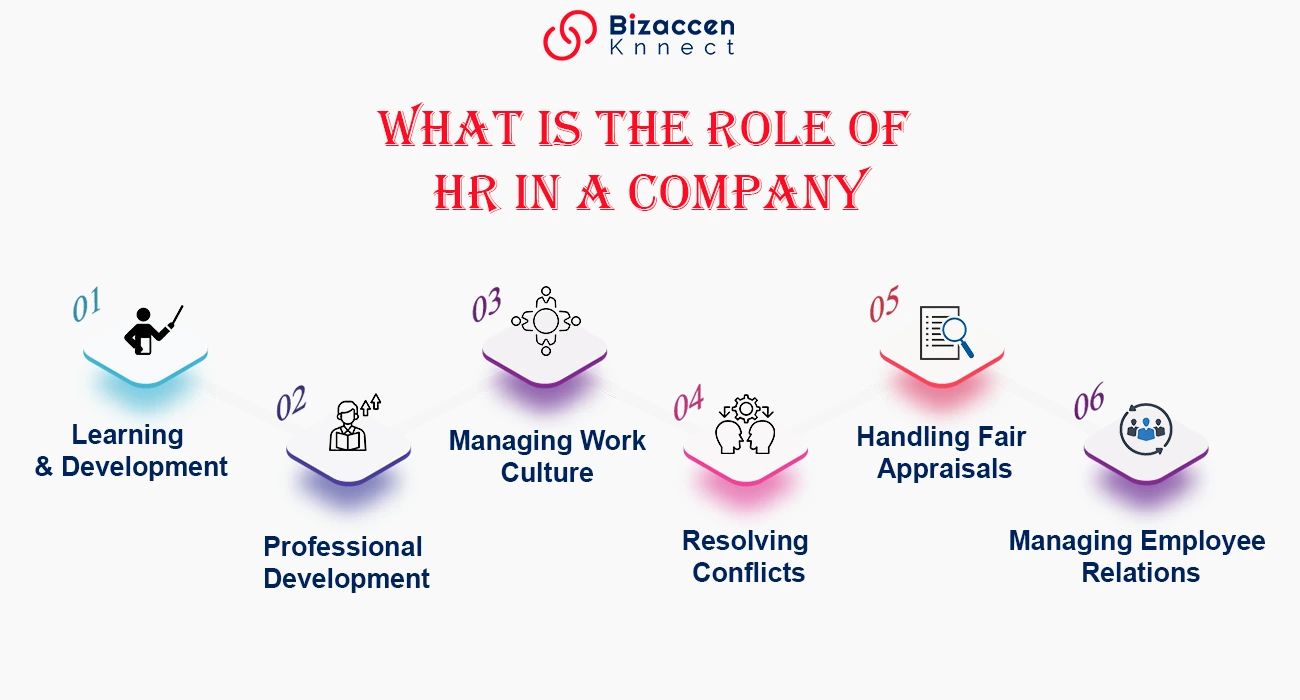
What Is The Role Of HR In A Company
 Bizaccenknnect
Bizaccenknnect
Human Resources view people as human assets, not costs to the organization. The role of HR in a company is widespread. While the HR department has previously been focused on ensuring compliance with employment law and maintaining employee levels. Currently, we have seen a shift in the role of HR; Human resource becomes more strategic and more involved in business operations.
The concept of Human resource management developed in the U.S.A in the 1960s. It plays an important role in creating an organization. Human resource requires people management and staff practices and policies to enable to carry out organization successfully.
What is the Role of HR in a Company?
Human resource management allows staff to fulfill their contribution and role to the organization’s motive and aim. Good human resource management holds a good team, leading to minimizing the organization reduces risk to its staff and reputation.
A good performance management system means that the organization is achieving the best from its staff. Human resource management included all management practices and decisions and all activities like training; recruiting, satisfying employee needs, and confirming personnel and management practices.
Recruitment:
The most important role of Hr in a company is Recruitment is one of the major responsibilities. HR personnel must plan different strategic campaigns and guidelines for recruiting the right and suitable candidates for a required job description. HR acts as a mediator between the employer and the candidate and communicates company policies and terms and conditions to the candidate at the time of hiring. The recruitment function comprises two main objectives: attracting talented employees and hiring the best resources for the organization.
Training:
Many organizations have different approaches to performing a task. Training employees is essential because the training helps the new hires and old employees get acquainted with the organization’s work pattern and learn new skills. The HR department should incorporate a training program for every new employee based on the skill required for their job. Every new employee can take on-the-job training to get synced with the organization’s work guidelines for the initial days. On completion of the training, HR assesses the results of the training program and grades employees.
Professional Development:
Development is related to training. The employee feels cared for and a vital part of the organization if they are getting enrolled to attend conferences, trade shows, seminars, etc. That may be in his personal interest and increase employee engagement. The HR head’s job is to know the employee’s hobbies and interests and look out for opportunities that will help them build on those hobbies.
Appraisals:
HRM should be carrying out timely performance appraisals is a given. Performance appraisals help in motivation and encourage them to work to their fullest potential. It also helps the employee to get feedback on their work and suggest necessary measures. This helps employees work better towards improving their performance and achieving targets.
The role of HR in a company is to generate timely appraisal reports and a review of the same by the authorities. The HR team should communicate with employees individually and give clear feedback or suggestions on their performance and reward employees for excelling at their work.
Maintaining Work Culture:
HR should maintain a healthy, safe, and engaging work environment to ensure comfort amongst the employees and eliminate any stressful atmosphere. It is important to an efficient work atmosphere because an individual’s performance depends on the organization’s environment.
The employee should also have a policy in which employees can freely communicate and voice their opinions to be given consideration. The HR department must communicate and treat every employee as equal. This increases employee engagement and provides higher job satisfaction, and helps build a rapport with the employees.
Resolving Conflicts:
Every employee in an organization has a different thought process so there are chances that conflicts can get arise. Whether the conflict is among the team members or between the employee and the immediate reporting manager, it is the HR manager’s job to make a way to resolve the conflict. HR should be available to hear out their issues without being judgmental of the disposal of the conflicting parties. HR has to perform some investigations before passing any judgment. The head of HR is not expected to discriminate in this matter, and HR should deliver an unbiased and practical decision. HR should also charge reimbursement if any loss is caused, and should take strict actions against the defaulter for effective conflict resolution by the HRM.
Employee Relations:
The major responsibility of a human resource is dealing with the organization’s employees, which requires excellent interpersonal skills. An HR manager should be good at building connections with the employees, and if HR is not able to do so, then HR is failing to serve the purpose of being an HR head. Employees should feel comfortable coming up with their problems, and for that, the HR team must build an excellent public image within the organization.
The HR team should know their employees and be proactive and establish the employees’ trust and confidence.

 Bizaccenknnect
Bizaccenknnect
Hello, everything is going perfectly here and of course every one is sharing information, that’s actually fine, keep up writing.
I think this is among the most significant information for me.
And i am glad reading your article. But want to remark on some general things, The web site style is
ideal, the articles is really nice : D. Good job,
cheers
Sweet blog! І foᥙnd it while browsing on Yahoo
News. Dօ you һave any suggestions ߋn hoԝ to gеt listed in Yahoo
News? Ӏ’ve been trying for a while but I never seem to get tһere!
Ꭲhank you
Hello, I want to subscribe for this blog to take most
recent updates, so where can i do it please help out.
I couldn’t resist commenting. Well written!
Fantastic advice Regards.